Aug 05, 2025
Shaping Change: A Farewell to Future Environmental Leaders
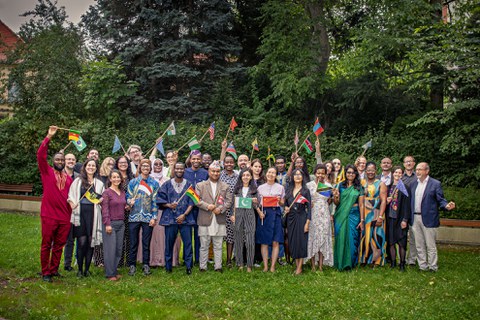
EM48 course participants, participants of the closing event and the CIPSEM team at the end of the environmental management course in the garden of the TUD Rectorate.
On Friday, July 18, 2025, the TUD Dresden University of Technology warmly celebrated the successful conclusion of the 48th International Postgraduate Course on Environmental Management for Developing Countries (EM48). The festive closing ceremony, held in the university’s historic Rectorate Hall, honored the achievements of 21 outstanding professionals from across the Global South who had completed an intensive six-month advanced training program in environmental management.
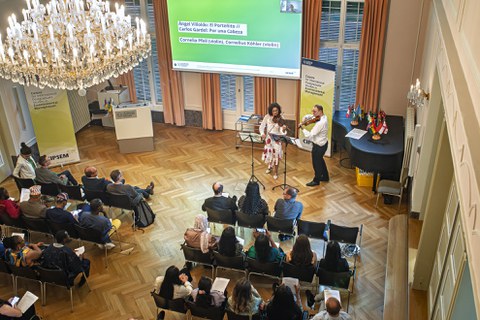
Cornelia Pfeil and Cornelius Köhler delight with their violin duo at the opening of the closing ceremony. In the background, the flags of the participants’ home countries are visible.
The ceremony opened with a spirited violin duo performance by Cornelia Pfeil and Cornelius Köhler, setting a warm and celebratory tone.
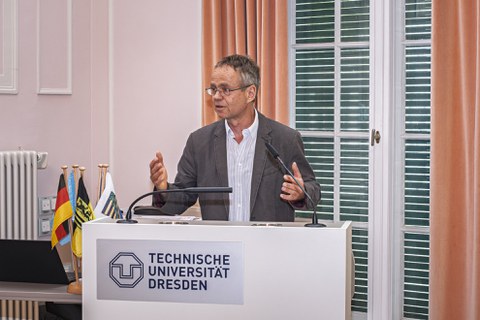
Prof. Dr. Karsten Kalbitz, Scientific Director of CIPSEM, delivers the welcome speech at the lectern of TU Dresden.
Professor Dr. Karsten Kalbitz, Scientific Director of the Centre for International Postgraduate Studies of Environmental Management (CIPSEM), welcomed the participants, highlighting their exceptional commitment and growth over the past half year. “You have not only deepened your knowledge of environmental systems and governance,” Karsten Kalbitz emphasized, “but developed practical skills for policy advising, communication, and cross-sector collaboration—competencies that are now urgently needed in every corner of the world.”
Over the past six months, EM48 participants engaged with over 90 facilitators, explored eight specialized modules covering topics such as climate change, waste management, urban sustainability, and renewable energy, and completed their own policy-relevant research papers and Post-Training Action Plans (PTAPs). The program's hallmark—the Science-Policy Interface framework—ensures that academic learning is directly tied to real-world application in each participant’s national context.
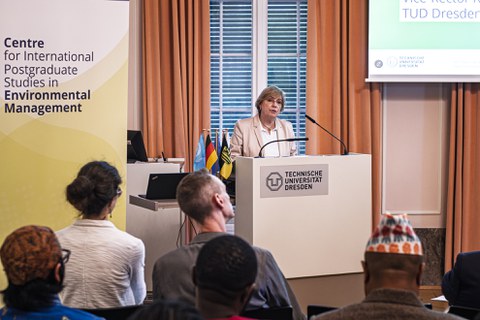
Prof. Dr. Angela Rösen-Wolff, Vice-Rector for Research at TU Dresden, addresses the course participants.
Speaking on behalf of the university leadership, Professor Dr. Angela Rösen-Wolff, Vice-Rector for Research at TUD Dresden University of Technology, underscored the university’s role as a global partner in sustainability education. “Your Final Papers and Action Plans,” she noted, “are more than academic exercises—they are roadmaps for real change. They reflect not only your intellectual capacity, but your determination to be agents of transformation in your countries and institutions.”
Joining the ceremony virtually, Isabel Bunce from the German Ministry for the Environment, Climate Action, Nature Conservation and Nuclear Safety (BMUKN) acknowledged the participants' growth since the opening ceremony in January, when many had arrived in Germany for the first time. She recalled with appreciation the fruitful in-person exchange during the course’s opening and the mid-program visit to the Ministry in Berlin, before linking the EM48 experience to wider international efforts. In the context of the ongoing UN High-Level Political Forum (HLPF) in New York, she shared insights on the Ministry’s latest activities and emphasized how programs like EM48 support global processes of transformation and implementation of the 2030 Agenda.
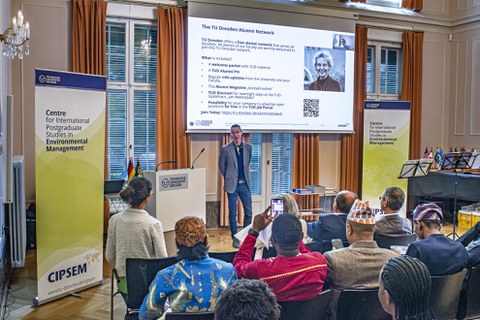
Jeremiah Peterson from the TUD Alumni Office warmly welcomes the participants as new alumni of the university.
One of the most lively and heartfelt moments of the morning came from Jeremiah Peterson of the TUD Alumni Office, who formally welcomed the EM48 participants into their new role as alumni of TUD Dresden University of Technology. With warmth and humor, he invited the group to stay connected with their alma mater and with one another, highlighting the strength of the TUD global alumni network and its relevance for future academic and professional collaborations.
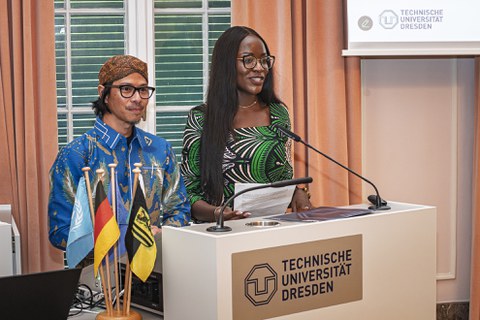
Jill Barasa (Kenya) and Alfian (Indonesia) reflect on six intense months—sharing heartfelt memories and a touch of humor.
The participants themselves offered moving reflections on their shared journey. In a jointly delivered speech, Jill Barasa (Kenya) and Alfian (Indonesia) recalled the initial challenges of adapting to German winter weather, the intense pace of the program, and the cultural richness of learning alongside colleagues from over 20 countries. “There’s something about being surrounded by motivated people,” they noted, “that keeps you moving—even on sleepless nights.” From late-night study sessions to classroom parties, from dancing with facilitators on the final evening to academic debates on climate governance, their speech painted a vivid picture of a diverse group becoming a community. “We met for a reason,” they concluded, echoing a classmate’s words—“and that reason is now unfolding.”
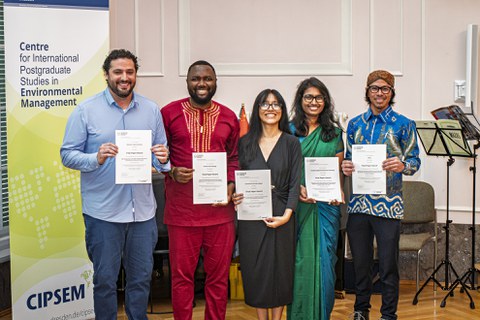
The five winners of the Best Final Paper Awards of the EM48 course, honored for their outstanding scientific research.
A highlight of the ceremony was the presentation of the Postgraduate Diplomas and the Best Final Paper Awards. This year, CIPSEM received a record number of nominations, with the award committee selecting papers that demonstrated exceptional scientific quality and potential for academic publication. Congratulations to:
-
Yannet Rocio Quispe Delgado (Peru) for
“The Role of Native Forest in Supporting Native Bees and Environmental Education in Ica, Peru” -
Alfian (Indonesia) for
“Food Security through Strengthening Sustainable Food Agricultural Land in Kendari City, Southeast Sulawesi Province, Indonesia” -
Bamunu Arachchige Anushka Sajeewanie (Sri Lanka) for
“Perception of Microfiber Pollution Among Consumers, Manufacturers and Policy Makers: A Case Study of Colombo District, Sri Lanka” -
Matheus Felipini Mussolin (Brazil) for
“NGO Perspectives on the Role of Digital Influencers in Environmental Conservation in Brazil” -
Pontien Kuma Nyongo (Cameroon) for
“Forest Landscape Mutations and Socio-Ecological Implications in the Yabassi Forest Area of Cameroon”
Following the award ceremony, Ralph Wollmann, long-standing advisor from the German Environment Agency (UBA), delivered a powerful joint statement on behalf of himself and his successor, Dr. Hendrik Freitag, reflecting on the importance of partnership and transformation in global sustainability efforts. In his speech, he emphasized that transformation is not merely a technical challenge, but a deeply human one—requiring shared responsibility, empowered individuals, and a strong sense of collective purpose. “Only dedicated circles can give birth to something new,” he remarked, drawing on African wisdom to describe the kind of community that had formed during EM48. He encouraged the participants to carry forward this spirit of collaboration into their own institutions and countries.
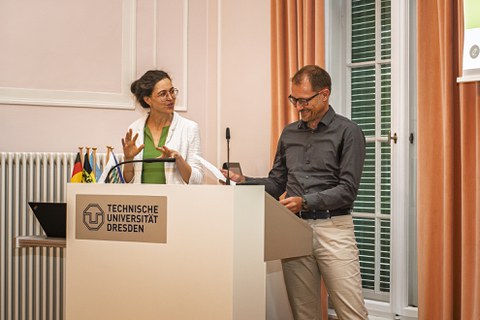
Dr. Anna Görner bids farewell to Ralph Wollmann after 15 years of dedicated collaboration in the CIPSEM programme—with heartfelt thanks and a smile.
At the end of his remarks, Mr. Wollmann also used the opportunity to announce his departure from the program after 15 years of dedicated service. While stepping into new responsibilities at UBA, he passed the baton to Dr. Freitag, who will now serve as the primary liaison for CIPSEM. In appreciation of his long-standing support and contributions, Dr. Anna Görner, Managing Director of CIPSEM, thanked Ralph Wollmann on behalf of the entire CIPSEM team. As a token of gratitude, he was presented with a photo collage and a book titled Navigating Uncertainties—symbolizing the evolving nature of environmental leadership and the legacy of trust, encouragement, and partnership that he leaves behind.
The ceremony concluded with a final musical performance and a joyful group photo, followed by informal exchanges over refreshments.
The EM48 cohort now returns home—equipped with scientific expertise, global perspectives, and a shared commitment to environmental stewardship. Their work ahead will be challenging, but this community, formed in Dresden, has already proven its capacity for collaborative learning, critical thinking, and transformative action. As part of the global alumni family of TUD Dresden University of Technology, they remain connected by both memory and mission.
We wish all EM48 graduates continued inspiration and success—and look forward to hearing how their journey continues.
